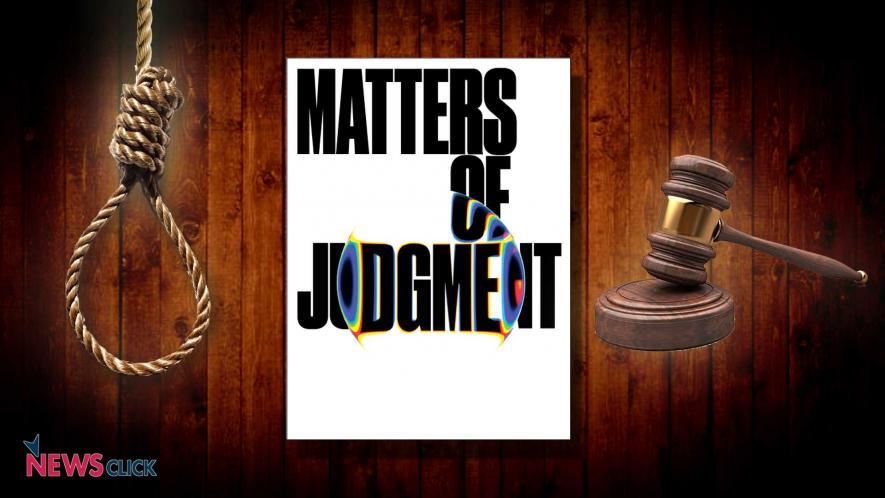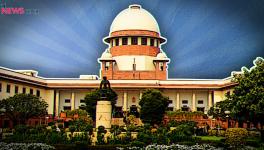Religious, Personal Beliefs of Judges Influence their Choice between Death Penalty or Life Imprisonment: Report

Newsclick Image by Nitesh Kumar
Pointing out the immense problems in the criminal justice system and the death penalty, the Centre on Death Penalty at National Law University, Delhi, brought out an opinion study report on Friday. The report, which is based on in-depth interviews with 60 former Supreme Court justices, unveiled the rampant use of torture to generate evidence, fabrication through recovery evidence, a broken legal aid system, and wrongful convictions.
The report, titled “Matters of Judgment”, is an attempt to understand “judicial thought and adjudicatory processes.” It observed that “torture was rampant” in India’s criminal justice system.
The report mainly focuses on three issues: investigative and trial processes, sentencing in death penalty cases, and judicial attitudes towards the death penalty.
Though the judges have expressed grave concerns about the criminal justice system and the hard realities of administering criminal justice in India, in conversation on death penalty these ‘realities’ hardly found mention. Quoting the example, 43 former judges acknowledged that wrongful convictions are a worrying reality in India’s criminal justice system. But when it came to the question of abolition of the death penalty, only five judges acknowledged the ‘possibility of error’ as a possible reason for it.
As per the study on the investigative and trial processes, 38 judges (out of 39 who responded) noted that “torture was rampant”. When asked about the torture, 12 judges remarked that the reason behind it is an overburdened police force. And 17 of them said that torture is unacceptable and does not work.
On the possibility of wrongful convictions within the criminal justice system of India, 6 judges out of 43, who responded to this question from the total of 49, denied such a possibility. 14 judges felt that wrongful convictions were a direct result of an improper investigation.
The report further noted that when asked about the reasons for the abolition or retention of the death penalty in India, 29 former judges identified abolitionist justifications and 39 observed retentionist justifications. Among the retentionists, 14 judges pointed out that there was no reason whatsoever to consider abolition in India. Three among the abolitionist judges strongly believed there was no reason to keep the capital punishment.
A judge who served at the Supreme Court for six years, is quoted in the report saying:
“Death penalty has to be retained because the law is still there. It is up to the Parliament to take it away, but according to me, it would be too dangerous to abolish the death penalty as I say there are many kinds of criminals, some of them are bloodthirsty and cannot be reformed. If the death penalty is abolished, they will be a menace to the society,”
The study, looking into the issue of the fabrication of evidences, notes that in many cases ‘the murder weapon was proved to be planted as it did not match the injury’. And also in some cases, ‘clothing was recovered at the behest of the accused’ but the accused did not understand the language in which the seizure memo was prepared.
“If you’re asking me whether I am concerned about unmerited acquittals? I’m not worried about them. I’m worried about unmerited convictions because the criminal jurisprudence is designed only to prevent an innocent being convicted. A criminal jurisprudence can afford to have a guilty person’s escape but not to have an innocent person proven guilty,” a judge who decided on nearly 180 murder cases in the appellate courts is quoted in the report on the legal aid system.
The report also noted that poor legal representation disproportionately impacts the poor.
One of the striking features brought out by the report is that half of the judges interviewed believed that the background of a judge, such as religion and personal beliefs, does play an influential role in the choice between death penalty and life Imprisonment.
The study concludes by saying that “while the arguments in support of the death penalty in abstraction may seem attractive, the normative coherence of the arguments in favour of the death penalty begins to thin when applied to the realities of the system.”
Get the latest reports & analysis with people's perspective on Protests, movements & deep analytical videos, discussions of the current affairs in your Telegram app. Subscribe to NewsClick's Telegram channel & get Real-Time updates on stories, as they get published on our website.
























